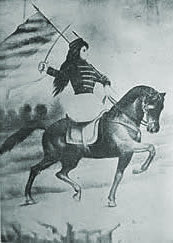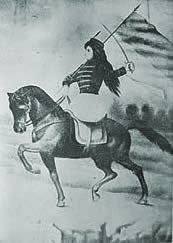
|
Women and Independence in Latin America An exploration of women's involvement in the Latin American Wars of Independence |

|

|
Women and Independence in Latin America An exploration of women's involvement in the Latin American Wars of Independence |

|
Gender:Female
Ethnic origen: White
Events:
| 1821 | - | Santa Catarina | - | Not applicable | - | She was born here. |
| 1835 | - | Montevideo | - | Unknown | - | She was forced to marry Manuel Duarte Aguiar here. |
| 1838 | - | Montevideo | - | Unknown | - | She left Manuel Duarte Aguiar. |
| 1839 | - | Santa Catarina | - | Patriot | - | She married Giuseppe Garibaldi |
| 1840 | - | Paraná | - | Patriot | - | She fought in the battle of the curitibans |
| 1842 | - | Montevideo | - | Unknown | - | She married Guiseppe Garibaldi on March 26. |
| 1849 | - | Italy | - | Unknown | - | She died and was buried in Italy. |
| 1849 | - | Italy | - | Unknown | - | She moved here with her husband and children and fought alongside Garibaldi for Italian emancipation. |
Connections:
Farroupilha WarBiography:
Anita Garibaldi, as she is better known, was born Ana Maria Jesus de Ribeiro in 1821 in the town of Laguna in what was then the province of Santa Catarina in Brazil. She was the daughter of Maria Antonieta de Jesus and Bento Ribeiro da Silva (Schumaher & Brazil, 77). In 1835, at fourteen years old, she married a shoemaker called Manuel Duarte de Aguiar but then left him three years later (Schumaher & Brazil, 78). Her far more famous relationship with the Italian mercenary Giuseppe Maria Garibaldi, took place as a result of the Farroupilha War, the Civil War which erupted in the neighbouring province of Rio Grande do Sul in 1835 and spread to southern Santa Catarina. The war was between Legalist (also known as Monarchist or Caramuru) soldiers loyal to the imperial crown in Rio and Republicans or Farroupilhas, led by Bento Gonçalves who had declared Rio Grande do Sul an independent republic. Garibaldi lent his support to the Republican side and was particularly involved in an important naval victory which led to the capture of Laguna in 1839 (Schumaher & Brazil, 78). Anita was staying with relations close to where Garibaldi’s ship was anchored and met him when he was a guest in their house. The two fell in love and Anita decided to run away with him and fight with him on the Farroupilha side, thereby flouting convention as she was still legally married to her first husband at the time.
Anita took an active, armed, part in various sea and land battles of the war and was taken prisoner at one point by Melo Albuquerque. Her first son, Menotti, was born in 1840 shortly before she had to escape a Monarchist attack on her house (Schumaher & Brazil, 78). Garibaldi was pensioned off by Bento Gonçalves in 1841 and the couple went with their son to Uruguay. The pair married in the church of São Bernardino in Montevideo in 1842, Anita’s first husband having now died. She had three more children in Montevideo, Rosita, who died in childhood, Teresita and Ricciotti. Garibaldi fought for Fructuoso Rivera against the Uruguayan General, Juan Manuel Rosas who sought independence (Schumaher & Brazil, 79). He set up the Italian Legion, in which Anita worked as a nurse. In 1847 Ana and her children were sent to Italy arriving in Genoa in 1848. When Garibaldi himself returned to Italy shortly after he took up the military cause of Italian emancipation and unification, a campaign in which Anita also actively supported him, leaving her children behind to fight in the retreat of Rome, whilst six months pregnant. Her health seriously weakened, she died in Mandriole, on 4 August 1849 leaving Garibaldi devastated. She has subsequently become an iconic female warrior figure both of the Farroupilha War in Brazil and of Italian Unification. There are monuments to her memory in Europe in Ravenna, Rome and Nice as well as in Brazil, in Belo Horizonte, Laguna (SC), Porto Alegre (RS) and Florianópolis (SC) (Schumaher & Brazil, 80).
References:
Schumaher, Schuma and Brazil, Érico Vital (editor). (2000) Dicionário Mulheres do Brasil de 1500 até a atualidade
Flores, Hilda A. Hübner (1989) Sociedade, Preconceitos e Conquistas
Ribeiro, Niamara Pessoa Silveira, Diva Ione (editor). (1985) Heroínas da Resistência Gaúcha
Silveira, Maria Dutra da Silveira, Diva Ione (editor). (1985) A Mulher na Revolução Farroupilha